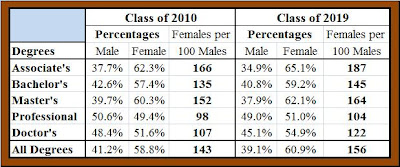The Increasing College Degree Gap; Will College Women's Centers Address *This* Gender Issue?
 The Department of Education recently updated its dataset on college degrees by gender, with actual data through the 2007-2008 academic year, and projected data through the 2018-2019 academic year).
The Department of Education recently updated its dataset on college degrees by gender, with actual data through the 2007-2008 academic year, and projected data through the 2018-2019 academic year).
The chart above shows the reversal between the 1966-1967 academic year and the 2018-2019 year for the percentage of all college degrees by gender: from 61% of all college degrees in 1966-1967 awarded to men, to a projected 61% of all college degrees in 2018-2019 awarded to women. The last year of gender parity for college degrees was 1981, and in almost every year since then, women have increased their share of all college degrees.
The chart below shows more detailed degree data by gender for this year's Class of 2010 and the Class of 2019 (both are estimates):
 The only degree category where men are currently slightly overrepresented (50.6%) is for "First-Professional Degrees," which includes M.D., D.D.S., and law degrees. The Department of Education estimates that by 2014-2015 there will be more women than men earning those degrees, and by 2018-2019 women will earn 51% of those degrees (see chart above).
The only degree category where men are currently slightly overrepresented (50.6%) is for "First-Professional Degrees," which includes M.D., D.D.S., and law degrees. The Department of Education estimates that by 2014-2015 there will be more women than men earning those degrees, and by 2018-2019 women will earn 51% of those degrees (see chart above). There are hundreds, if not thousands, of University and College Women's Centers across the country, here is a partial list. A Google search of "College Women's Centers" finds almost 6,000 links on the Web. A Google search of "College Men's Centers" finds almost no links on the Internet (a few hundred, now inlcuding this post), and asks the question: Did you mean: "College Women's Centers"?
The first search points to a book titled "University and College Women's Centers: A Journey toward Equity":
"This handbook provides insights from women's center directors at institutions across the country on how best to build a women's center that can improve the quality of women's experiences in college. The best centers aid universities and colleges in responding to particularly difficult challenges in higher education related to gender."
Questions:
1. Now that women completely dominate higher education at almost every degree level and men have clearly become the "second sex" in U.S. higher education, isn't there a greater need for thousands of "Men's Centers" on college campuses than "Women's Centers" to help address the challenges males face completing college and help improve the quality of men's experiences in college?
2. Didn't the "journey toward equity" that is mentioned in the book title above end back in 1981 when women started earning a greater share of college degrees than men?
3. If the best college Women's Centers "respond to particularly difficult challenges in higher education related to gender," will they now turn their attention to the apparent difficult challenges men are having completing college degrees at the same rate as women?
The preceding article is from one of our external contributors. It does not represent the opinion of Benzinga and has not been edited.
© 2025 Benzinga.com. Benzinga does not provide investment advice. All rights reserved.


